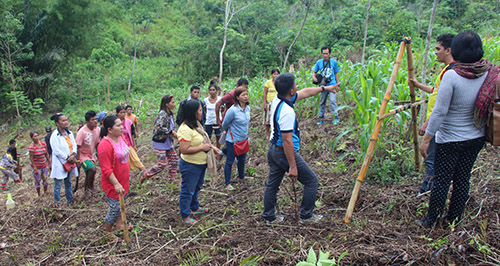Members of the Nagkahiusang Tribung Higaonon sa Lawan-lawan at Las Nieves, Agusan del Norte is now opening its door in learning new farming technology ideal in sloping areas.
A tripartite team of DA Caraga through the Regional Corn Program, Provincial Agriculture Office of Agusan del Norte and Municipal Agriculture Office of Las Nieves, conducted a two-day training (May 16-17, 2019) on Sustainable Corn Production in Sloping Areas (SCoPSA) particularly at Sitio New Canaan, Km. 22, Lawan-lawan, Las Nieves, Agusan del Norte.
Bae Victoria Macaundag, chairperson of the Nagkahiusang Tribung Higaonon sa Lawan-lawan said it is high time that they will embrace the new technology promoted by the government.
“Before, we are just relying on our own way of farming just to sustain our lives, but nowadays we want to contribute to the development of the country, and it should start in our own family,” she explained in her native tongue.
SCoPSA is a farming technology aimed to help farmers in sloping areas to increase farm production at the same time protecting the soil from erosion.
“I am happy that DA is now extending help to us through SCoPSA, so we can avail of seed and other inputs from the government,’ Bae Victoria said.
Nagkahiusang Tribung Higaonon sa Lawan-lawan with 30 active members is planning to have a two hectares communal demo farm, aside from individual members who will adopt the technology brings to potentially 30 hectares SCoPSA areas at the soonest possible time.
Under SCoPSA demo farm, DA Caraga will provide to the project cooperator two bags of corn seeds for every hectare, fertilizer, planting materials of fruit trees, and other crops preferred by the recipient and a technology training.
In the region, DA Caraga had already established five SCoPSA demo farms, particularly at Brgy. Malapong, Buenavista, Cubi-cubi, Nasipit, and Lawan-lawan, Las Nieves, Agusan del Norte; Cagdianao and Basilisa in Province of Dinagat Islands; and soon in Sitio New Canaan, Las Nieves, and an additional proposed site at La Paz, Agusan del Sur. (Aurelius P. Arais/DA Caraga)







